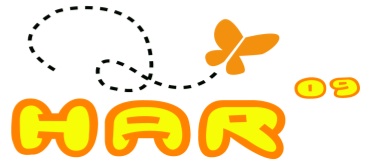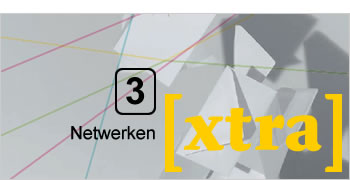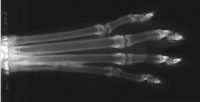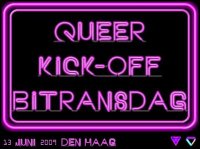 Sinds vandaag staat het programma voor HAR online. In vier dagen tijd (van 13 t/m 16 augustus) zijn er meer dan 100 lezingen en tal van workshops. Kaartjes kosten tot 20 juli 185, daarna vervalt de early bird korting en zijn ze 205 euro. Bestellen kan hier.
Sinds vandaag staat het programma voor HAR online. In vier dagen tijd (van 13 t/m 16 augustus) zijn er meer dan 100 lezingen en tal van workshops. Kaartjes kosten tot 20 juli 185, daarna vervalt de early bird korting en zijn ze 205 euro. Bestellen kan hier.
The moment everyone has been waiting for has arrived! We are proud to present the HAR2009 program: more than 100 talks on technology, encryption, surveillance, privacy, vintage hardware, free content, environmental issues, lock picking, open source software, DRM, censorship and more. The list of talks is long, and it is quite impossible to zoom in on each of the talks in this short announcement. However, we’d like to highlight some of our favorite talks. And do feel free to dive into the program and explore what’s there.The program is headlined by Wikileaks exposing the inner workings of state and corporate power. Facing legal actions, censorship, assasinations and other unpleasantries, Wikileaks aims to publish information that is being repressed for whatever reason. In their talk, Wikileaks will explore the stories behind some of the most interesting leaks and present the Most Wanted Leaks of 2009. The importance of leaking and the relation to the brewing climate of censorship worldwide will be followed by an analysis about how the media shapes and creates history.
Today, electronic surveillance is ubiquitous. The Electronic Frontier Foundation (EFF) will look at the situation in the United States, and explain how the lessons that they learned might translate to the European situation. Recently, the EFF introduced a set of guidelines for individuals to protect themselves from surveillance (the Surveillance Self-Defense project), to opt-out of some of the regulations and practices that one might find objectionable or inappropriate. They do this by explaining relevant laws and introducing technological countermeasures, as well as comparing the relative security of different technologies people use in everyday life to ward off government surveillance.
Finally, we’ll have a really interesting series of talks that deal with one of the last bastions of apparent security: the GSM network. For over a decade, people have been lulled into a false sense of security regarding their conversations and communication over the GSM network. Voice communications are encrypted using the A5 encryption algorithm. Initally not disclosed, the algorithm was reverse engineered almost 10 years ago. The first of the three talks will look at the current state of attacks on this algorithm. The second talk will introduce airprobe, a suite of software and hardware (based on GNURadio) that can be used to sniff and then analyze GSM transmissions. And if that wasn’t enough, the last talk will present openbsc: a open stack of software that can be used to set up your own GSM base station.
This is only the top of the proverbial iceberg, and besides lectures expect to see a Capture-the-Flag contest (where the objective is to capture a virtual flag hidden on a server by breaking into the server), a panel discussion on copyright and the entertainment industry with representatives from `the dark side’, workshops on electronics, reprap rapid prototyping, hacker jeopardy, a cartoon quiz and more.
 (Het derde nummer van [xtra], een nieuw blad van XS4all, is zojuist verschenen en gaat over netwerken. Bij deze mijn column voor het blad. [xtra] staat ook online, op www.xs4all.nl/xtra/editie3/index.php/.)
(Het derde nummer van [xtra], een nieuw blad van XS4all, is zojuist verschenen en gaat over netwerken. Bij deze mijn column voor het blad. [xtra] staat ook online, op www.xs4all.nl/xtra/editie3/index.php/.) [Gesproken column voor
[Gesproken column voor  Natuurlijk is Mouhavi geen echte hervormer – dan had-ie ’t nooit tot kandidaat geschopt. De Raad van Hoeders bepaalt immers welke aspirant-presidenten op de kieslijst mogen staan, dat filtert behoorlijk uit. Maar ik geloof niet dat de Iraanse bevolking alle heil van Mousavi verwacht. Het was meer dat ze eindelijk eens tegen Ahmajinedad konden stemmen. Al dagen voor de stembussen open gingen, werd er feest gevierd op straat.
Natuurlijk is Mouhavi geen echte hervormer – dan had-ie ’t nooit tot kandidaat geschopt. De Raad van Hoeders bepaalt immers welke aspirant-presidenten op de kieslijst mogen staan, dat filtert behoorlijk uit. Maar ik geloof niet dat de Iraanse bevolking alle heil van Mousavi verwacht. Het was meer dat ze eindelijk eens tegen Ahmajinedad konden stemmen. Al dagen voor de stembussen open gingen, werd er feest gevierd op straat. Gesproken column ter opening van de Queer Kick-off BiTransdag in Den Haag, eerder vanmiddag.]
Gesproken column ter opening van de Queer Kick-off BiTransdag in Den Haag, eerder vanmiddag.] [Gesproken column voor De Praktijk, Radio 1 (Avro), elke dag tussen 13:30 en 14:30.]
[Gesproken column voor De Praktijk, Radio 1 (Avro), elke dag tussen 13:30 en 14:30.] Verscholen in onze dromen zit de technologie van onze tijd. Zelden zul je midden in de nacht in een paardenkoets stappen of met een tondeldoos vuur maken, terwijl onze opa’s en oma’s dat vast nog geregeld deden. In je slaap een koelkast hebben die zelfstandig de boodschappen afhandelt, is al evenzeer uitzondering en waarschijnlijk pas regel in de dromen van ons nageslacht. Maar iemand opbellen of de tv aanzetten in een droom is tegenwoordig heel gewoon, dat is na het ontwaken niet iets dat je raar of opmerkelijk vindt.
Verscholen in onze dromen zit de technologie van onze tijd. Zelden zul je midden in de nacht in een paardenkoets stappen of met een tondeldoos vuur maken, terwijl onze opa’s en oma’s dat vast nog geregeld deden. In je slaap een koelkast hebben die zelfstandig de boodschappen afhandelt, is al evenzeer uitzondering en waarschijnlijk pas regel in de dromen van ons nageslacht. Maar iemand opbellen of de tv aanzetten in een droom is tegenwoordig heel gewoon, dat is na het ontwaken niet iets dat je raar of opmerkelijk vindt. Gisteren heb ik een MacMini gekocht die als server gaat dienen. Een plaats ervoor vinden kostte wat gedoe, vooral omdat er veel logistiek aan te pas kwam: het snoertje voor de monitor paste niet op mijn oude VGA en het was al na zessen toen ik dat ontdekte (gelukkig was de Apple winkel in de Bijenkorf nog open), en op mijn bureau moest er van alles verhuisd worden, temeer daar ik ook een nieuwe externe disk had gekocht.
Gisteren heb ik een MacMini gekocht die als server gaat dienen. Een plaats ervoor vinden kostte wat gedoe, vooral omdat er veel logistiek aan te pas kwam: het snoertje voor de monitor paste niet op mijn oude VGA en het was al na zessen toen ik dat ontdekte (gelukkig was de Apple winkel in de Bijenkorf nog open), en op mijn bureau moest er van alles verhuisd worden, temeer daar ik ook een nieuwe externe disk had gekocht.
 Toen ik hier in 1991 kwam wonen, heb ik drie grote knollen van de
Toen ik hier in 1991 kwam wonen, heb ik drie grote knollen van de 

 [Gepubliceerd in Lover, juni 2009.]
[Gepubliceerd in Lover, juni 2009.]